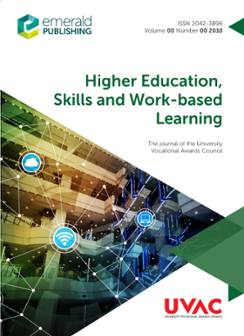Higher Education, Skills and Work-Based Learning: Volume 11 Issue 1
Strapline:
The journal of the University Vocational Awards CouncilTable of contents
The creative industries and degree apprenticeships: the benefits and challenges of adoption for small and micro businesses
Tim RileyThe purpose of this paper is to identify the needs and receptiveness of the creative industry sectors, in particular small and micro businesses, in respect of the adoption and…
Needs assessment for vocational skills training for unemployed youth in eThekwini Municipality, South Africa
Celestin MayombeThe purpose of this paper is to examine how the eThekwini Municipal Academy (EMA) conducts training needs assessments for vocational skills training for unemployed and…
An investigation of research gaps in reported skills required for Industry 4.0 readiness of Brazilian undergraduate students
Izabela Simon Rampasso, Sidney L.M. Mello, Rubens Walker, Victor G. Simão, Robson Araújo, Juliana Chagas, Osvaldo Luiz Gonçalves Quelhas, Rosley AnholonThe objective of this study is to identify research gaps related to skills required for Industry 4.0, considering research in the context of Brazilian undergraduate courses. In…
Employer-oriented personal branding: methods and skills for Indian business school students
Shweta Kushal, Rajendra NargundkarThe purpose of this paper was to provide a framework of methods and skills for employer-oriented personal branding among business school students to create an effective digital…
Roadblocks to university education for diploma engineers in Bangladesh
Gazi Mahabubul Alam, Md. Abdur Rahman ForhadDiploma Engineers (DE) mainly receive practical and skills-oriented education and training in the area of technical and vocational subjects from the polytechnic system. Globally…
Student’s entrepreneurial orientation and intentions: A study across gender, academic background, and regions
Sumit Kumar, Zahoor Ahmad Paray, Amit Kumar DwivediThis study is aimed to measure and understand the relationship between individual entrepreneurial orientation (IEO) and entrepreneurial intention (EI) among students of higher…
Improving graduate outcomes : Implementation of problem-based learning in TVET systems of Nigerian higher education
Ugochukwu Chinonso Okolie, Elisha Nwonu Elom, Paul Agu Igwe, Michael Olayinka Binuomote, Chinyere Augusta Nwajiuba, Ntasiobi C.N. IguThis study explores how the implementation of problem-based learning (PBL) in technical and vocational education training (TVET) systems of Nigerian higher education (HE) can…
Developing professional knowledge through innovation in higher education
Odd Rune StalheimThis paper aims to examine how pedagogical innovations in practical training facilitate professional learning among higher education (HE) students.
Work integrated learning resources for students with disabilities: are post-secondary institutions in Canada supporting this demographic to be career ready?
Laura E. Gatto, Heather Pearce, Luiza Antonie, Miana PlescaThe Government of Canada is adopting the pedagogical practice of Work Integrated Learning (WIL) to help youth develop the career ready skills needed to transition from school to…
Developing curriculum for industry 4.0: digital workplaces
Mita Brahma, Shiv S. Tripathi, Arunaditya SahayThe purpose of this paper is to introduce a framework used in a program for working executives, designed to prepare them for the digital workplace environment of industry 4.0.
“It's a very different world”: work transition and employability of higher education graduates
Sílvia Monteiro, Leandro Almeida, Adela García-AracilThis study addresses the specific topic of transition between higher education and the world of work, taking differences naturally inherent to the individual and to the…
Learning method design for engineering students to be prepared for Industry 4.0: a Kaizen approach
Md. Zahid Hasan, Avijit Mallik, Jia-Chi TsouUnderdeveloped along with developing countries face enough crisis of human resources in high-tech industries. As a result, the amount of waste is higher along with less…
Perception gaps on employable skills between technical and vocational education and training (TVET) teachers and students: the case of the garment sector in Ethiopia
Shoko Yamada, Christian S. OtchiaThis article focuses on the perception gaps between teachers and students of technical and vocational education and training (TVET) related to garment production and the reasons…
Developing resilient graduates to be future workplace leaders
Nikki McQuillan, Christine Wightman, Cathy Moore, Una McMahon-Beattie, Heather FarleyVocational higher education and skills are recognised as key factors in shaping an economy to adapt to fast-emerging business models that disrupt workplace behaviours. Employers…
Perceptions of culinary education and chef apprenticeships in Ireland
Emily Gray, Kathleen Geraldine FarrellThe relationship between the shortage of chefs for the hospitality industry in Ireland and the lack of uptake for chef apprenticeship is an underexplored topic. This study…
Characteristics transferred into simulation-based learning of nursing programs
Cristine Hermann Nodari, Daiane Riva de Almeida, Fabiano de Lima Nunes, Jefferson Dobner Sordi, Marta BezThe purpose of this research is to relate the characteristics transferred from teaching into simulation-based learning in nursing by highlighting how they are presented and, thus…
The skill of discipline – measuring F.I.R.S.T discipline principles in higher education
Hana Krskova, Chris Baumann, Yvonne Breyer, Leigh Norma WoodHuman capital theory suggests that any increase in skills translates into greater productivity of the workforce. Non-cognitive skills, in particular, play a critical role in many…
Making the case for virtual competency-based education: Building a twenty-first century small business workforce
Steven Vaughn Cates, Sean Doyle, Lisa Gallagher, Gary Shelton, Noel Broman, Blake EscudierThe purpose of this paper is to present a competency-based curriculum design model based on a set of ten foundational professional competencies (PCs) that prepare college…

ISSN:
2042-3896Online date, start – end:
2011Copyright Holder:
Emerald Publishing LimitedOpen Access:
hybridEditor:
- Prof Tony Wall